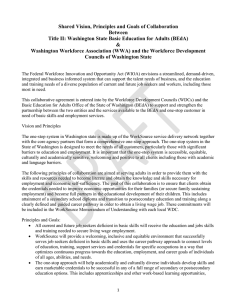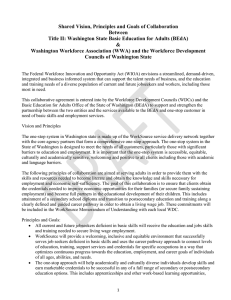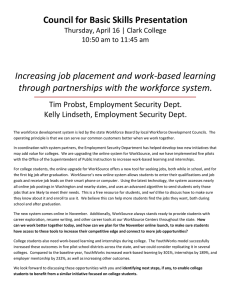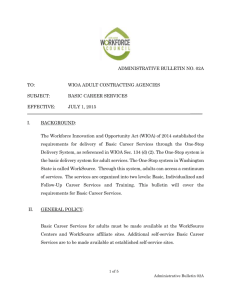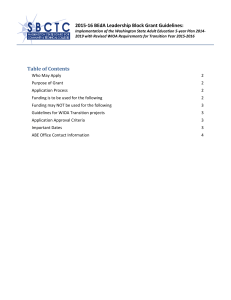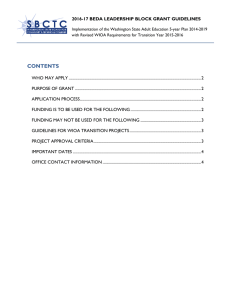Shared Vision, Values & Principles of Collaboration Between
advertisement
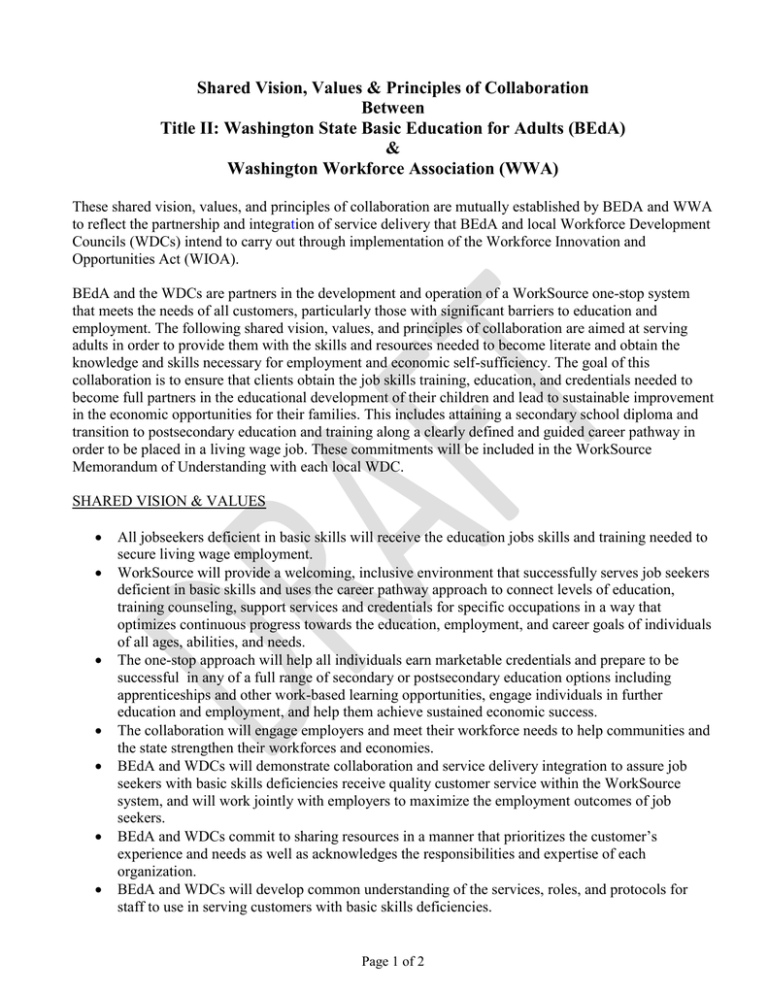
Shared Vision, Values & Principles of Collaboration Between Title II: Washington State Basic Education for Adults (BEdA) & Washington Workforce Association (WWA) These shared vision, values, and principles of collaboration are mutually established by BEDA and WWA to reflect the partnership and integration of service delivery that BEdA and local Workforce Development Councils (WDCs) intend to carry out through implementation of the Workforce Innovation and Opportunities Act (WIOA). BEdA and the WDCs are partners in the development and operation of a WorkSource one-stop system that meets the needs of all customers, particularly those with significant barriers to education and employment. The following shared vision, values, and principles of collaboration are aimed at serving adults in order to provide them with the skills and resources needed to become literate and obtain the knowledge and skills necessary for employment and economic self-sufficiency. The goal of this collaboration is to ensure that clients obtain the job skills training, education, and credentials needed to become full partners in the educational development of their children and lead to sustainable improvement in the economic opportunities for their families. This includes attaining a secondary school diploma and transition to postsecondary education and training along a clearly defined and guided career pathway in order to be placed in a living wage job. These commitments will be included in the WorkSource Memorandum of Understanding with each local WDC. SHARED VISION & VALUES All jobseekers deficient in basic skills will receive the education jobs skills and training needed to secure living wage employment. WorkSource will provide a welcoming, inclusive environment that successfully serves job seekers deficient in basic skills and uses the career pathway approach to connect levels of education, training counseling, support services and credentials for specific occupations in a way that optimizes continuous progress towards the education, employment, and career goals of individuals of all ages, abilities, and needs. The one-stop approach will help all individuals earn marketable credentials and prepare to be successful in any of a full range of secondary or postsecondary education options including apprenticeships and other work-based learning opportunities, engage individuals in further education and employment, and help them achieve sustained economic success. The collaboration will engage employers and meet their workforce needs to help communities and the state strengthen their workforces and economies. BEdA and WDCs will demonstrate collaboration and service delivery integration to assure job seekers with basic skills deficiencies receive quality customer service within the WorkSource system, and will work jointly with employers to maximize the employment outcomes of job seekers. BEdA and WDCs commit to sharing resources in a manner that prioritizes the customer’s experience and needs as well as acknowledges the responsibilities and expertise of each organization. BEdA and WDCs will develop common understanding of the services, roles, and protocols for staff to use in serving customers with basic skills deficiencies. Page 1 of 2 PRINCIPLES OF COLLABORATION What BEdA Will Do Participate in a locally driven, fully integrated WorkSource service delivery system. Provide staff training, technical assistance and consultation to WorkSource partners on service delivery to individuals with basic skills needs. Participate in annual reviews of WorkSource services and resources. Assign BEdA staff at designated co-located WorkSource locations, and negotiate any occupancy costs (e.g., office space, equipment, utilities, etc.). BEdA staff will support integrated staff and co-located services whenever and wherever possible that move clients to living wage jobs. The BEdA staff if assigned at WorkSource locations will contribute to the success of the one-stop system by participating in the orientation, referral and joint service delivery to individuals with educational needs. Participate in the development and implementation of the local WorkSource Business Plan and delivery of employer services aimed at the employment of job seekers with basic skills deficiencies. Contribute to the infrastructure of the WorkSource system costs financially and with in-kind support in proportion to the relative benefits received by BEdA customers and consistent with federal regulations under Title II. Refer and coordinate services for BEdA clients who are eligible and for whom funds are available so they receive the Title I and Title II WorkSource and training services they need in order to achieve their employment goals which are based on the local Memorandum of Understanding and local WorkSource protocols. Provide educational testing and placement services in collaboration with the WDCs to BEdA clients. What WDCs Will Do Assure that the WorkSource system provides fully accessible and integrated service delivery to job seekers with basic skills deficiencies. Work with BEdA staff to implement successful orientation, referral and joint service delivery methods that assists job seekers with basic skills deficiencies in receiving seamless services within the WorkSource system. Lead the development and the implementation of the local WorkSource Business Plan and establish the strategic direction to serve employers who seek to employ BEdA clients. Lead and convene WorkSource partners to advocate for the needs of customers, particularly individuals who experience employment and education and training barriers. Determine availability of WIOA Title I and II funds for BEdA customers who are eligible for services. _________________________________________ Jon M. Kerr Date BEdA Director _________________________________________ Cheryl Fambles Date WWA President Page 2 of 2
